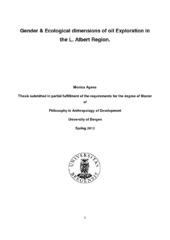| dc.description.abstract | Abstract The oil industry is extractive as well as capital intensive, and it often seeks to serve the interests of those controlling the means of production at the expense of other players/stakeholders. The activities of the oil industry in Bullisa and Hoima districts in Uganda have had detrimental impacts on the livelihoods, culture and the environment of the indigenous people living within these resource rich areas. This thesis seeks to address the disharmony existing between the policy economy from, firstly, the perspective of political ecology. Secondly, I seek to address the disconnection between the needs of the economy and those of the people and the environment, as will be shown, from a gendered dimension. Through participant observation the study was informed by findings relating to the gas flaring exercise undertaken by oil companies. This exercise showcased adverse climate implications for the environment as well as posed a health risk for the residents of Buliisa District. The study also highlights the irregularities and inefficiency surrounding the compensation for crops destroyed during seismic surveys, and similar issues regarding temporary evacuations to allow for flaring. Other findings relate to gender stereotyping of informal labor for the Oil Company, issues of land grabbing and expectations from the revenue sharing. The last chapter addresses the destruction of cultural sites and its implication on cultural and religious dimensions of the Bagungu and Bakobya. Supplementing the written material in the thesis itself is a documentary made from the area which is attached to this thesis. The purpose of the study is to contribute to the aim of ensuring that culture, livelihoods and expectations of the indigenous people fit within the economically motivated role of the oil industry, through prioritizing the interests and concerns of the indigenous people in the oil rich area. What can be learnt from this study is that decisions should not only be taken at a political level but also relate to social and cultural dimensions, as well as be informed by notions economically just and non-exploitative and non-discriminatory policies. | en_US |
